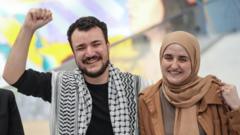Columbia University activist Mahmoud Khalil's recent release from over three months in immigration detention has sparked renewed dialogue about free speech and activism related to pro-Palestinian rights in the United States. Upon his return to Newark, New Jersey, Khalil proclaimed that his freedom serves as a powerful message to the Trump administration, highlighting the futility of attempts to stifle pro-Palestinian voices.
"My existence is a message," Khalil stated to the BBC, underscoring the significance of his release following his arrest on March 8 during a pro-Palestinian demonstration at the university. His detention triggered widespread protests in cities such as New York and Washington, D.C., with advocates rallying in solidarity with him and others facing similar fates.
The U.S. government's pursuit of Khalil's deportation is rooted in claims that his activism may undermine foreign policy interests. Nonetheless, Khalil has expressed unwavering determination to continue his advocacy for Palestinian rights and to represent the many immigrants who remain in detention facilities across the nation.
In a poignant display of resistance, he held flowers gifted by supporters, shouting "free Palestine" as he concluded his remarks. Khalil, who welcomed a baby son during his incarceration, was also flanked by New York Congresswoman Alexandria Ocasio-Cortez. She emphasized that his release signals a broader failure of the Trump administration to effectively deport advocates who speak out against injustices.
Ocasio-Cortez remarked, "The Trump administration knows that they are waging a losing legal battle...they are violating the law." Her comments came in light of another recent case involving Tufts University student Rumeysa Ozturk, who was detained after voicing criticism of Israel's actions and subsequently released on bail.
A recent judge's decision ruled that Khalil posed neither a flight risk nor a danger to the community, allowing him to leave the detention center in Louisiana. However, the Trump administration has vowed to appeal the ruling, with White House spokesperson Abigail Jackson claiming that a local judge does not possess the jurisdiction to authorize Khalil's release, signifying an ongoing legal struggle.
As Khalil begins to rebuild his life alongside his family, his struggle continues to represent the ongoing fight for immigrant and Palestinian rights, drawing attention to the broader implications of activism in a changing political landscape.





















